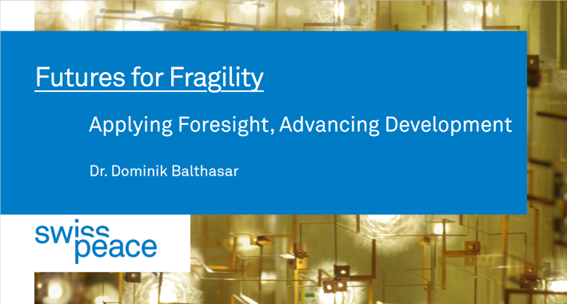Blog
“Think the Unthinkable” and “Do the Undoable”
In a policy brief for “swisspeace” GDL member Dominik Balthasar writes about how strategic foresight can be applied in international development. Strategic foresight is a method that is being tested alongside others in different contexts. But what makes the approach interesting and what distinguishes it from other methods?
“Constituting a “strategic thinking capacity”, foresight is fundamentally about expanding perceptions of future options available, and enhancing the operational context in which a strategy is developed. In contrast to forecasting, which seeks to predict and be probabilistic about the future by extrapolating from prevailing data, foresight sets out to uncover the possibility of multiple, plausible futures,” writes Dominik.
Why is it seemingly challenging to work with strategic foresight in development approaches? The brief states: “Although couching international aid frameworks in concepts of risk certainly comes with distinct advantages, strategic foresight taken seriously not only calls risk-informed approaches to development into question, but also provides a constructive and more compelling alternative – namely one that unlocks development trajectories.”
A few selected passages show that the concept of strategic foresight is interesting and certainly still has to overcome some hurdles in international development:
“Fabricating ‘analogies from the future’ is the purview of strategic foresight. Rather than limited to creative thinking and daydreaming, however, strategic foresight constitutes a systematic analytical process for engaging with uncertain future developments.”
“One of the biggest promises foresight holds for overcoming conflict and fragility lies in it scrutinising prevailing prescriptions, and encouraging all actors involved to imagine the unimaginable.”
“Even though foresight is no silver bullet to ‘make fragility history’, prevailing experiences with applying foresight both to and in contexts of fragility suggests that there is a potential for futures thinking to support processes towards peace and prosperity.”
“International peace and development actors need to acknowledge that, instead of being for the future, strategic foresight works with the future, for the present.”
Dominik Balthasar summarises his policy brief as follows:
“This policy brief demonstrates how strategic foresight can valuably be brought to bear in contexts of conflict and fragility. Making the case that contexts of development and fragility do not belong to the sphere of risk, but rather pertain to the universe of uncertainty, the paper depicts means by which scenario exercises can contribute to the puzzle of peace. At heart, the brief argues for the need of moving beyond risk-informed approaches and tapping the full potential of strategic foresight in order to unlock unchartered future trajectories from conflict and fragility towards peace and prosperity.”
Read more here.
About the author:
Dominik Balthasar is an international development expert in research, policy, and practice. He is currently a consultant based in Manila, where his work focuses on conflict-affected countries.
Published on May 4, 2023.
Image Credit: Lieven van Melckebeke
